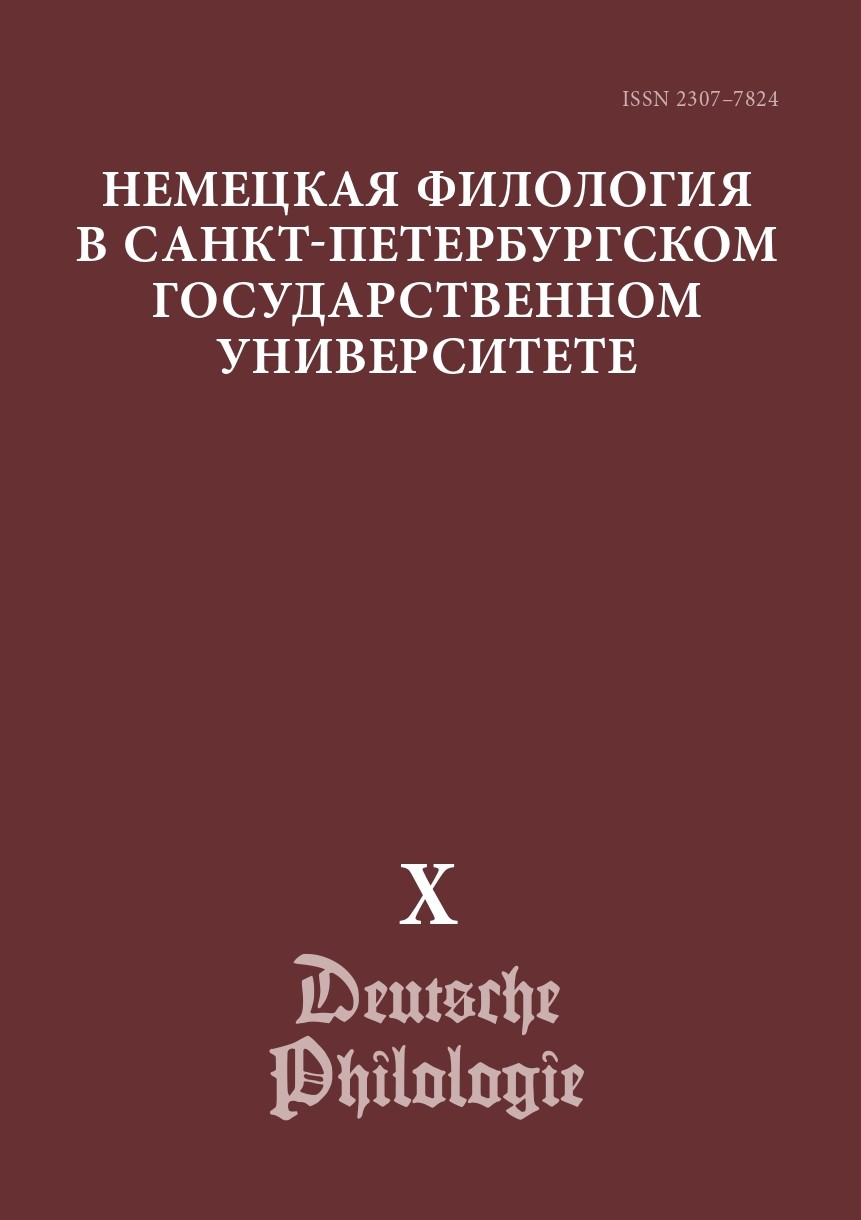TEXTSORTENMERKMALE UND GRAMMATIKALISIERUNG IN DIACHRONER PERSPEKTIVEText type features and grammaticalization in diachronic perspective
Abstract
Using the example of the text type school program script of the 18th century, the paper examines grammaticalization processes with regard to the development of the future tense with werden and the meaning of modal verbs. The aim is to gain insights into the differentiation of grammaticalization processes and the formation of text type characteristics. The paper is based on the assumption that language history can be understood as the history of text varieties. At the same time, this implies that linguistic features, which can be found in agreement in a multitude of text copies of different text types in the 18th century, do not necessarily represent linguistic features, i. e. formulation patterns, as they are inherent in the developing text types. The aim of the paper is therefore to identify the difference between grammaticalization phenomena and text type characteristics. In doing so, research on the history of language can first be drawn upon in order to interpret individual relevant linguistic phenomena and grammaticalization phenomena in a way that is specific to the text type. For comparison purposes, Vladimir Admoni’s findings on the German language of the 18th century in the field of lliterary and philosophical communication are compared with the field of upbringing and education. In the comparison of two texts, the development of the text type from a tract to the school program script can be examined simultaneously. Furthermore, results are expected which show the common status of grammaticalization processes but, with regard to the text type, also demonstrate specific linguistic formations in the grammatical area of the modality, which was promoted in a context of reflection and reflexivity in the 18th century.
Keywords:
formulation pattern, future, grammaticalization, modality, modal verbs, language history, type of text
Downloads
References
Quellen
Alberti J.F. Der treue und geschickte Informator: Das ist Deutlicher
Unterricht, wie man die Jugend auf eine GOTT wohlgefällige Art mit viel Segen
unterrichten könne. Halle: Johann Christpoh Krebsen, 1727. 72 S.
Leun J.G.F. Einige Bemerkungen über die Vortheile, welche die Erlernung
der alten Sprachen der wissenschaftlichen Ausbildung des Geistes verschaffen:
Eine Einladungsschrift. Giessen: Johann Jacob und Johann Wilhelm Braun, 1791. 14 S.
Literatur
Admoni W. [G.]. Historische Syntax des Deutschen. Tübingen: Niemeyer, 1990. 287 S.
Andreeva A. Diskurslinguistisches Potential der Modalität der Notwendigkeit in sprachwissenschaftlichen Texten // Kommunikative Praktiken in sozialen Kontexten: Sprachliche Mittel im Einsatz / hrsg. von Ch. Gansel, S.Nefedov, I.Jesan. Münster: LIT, 2019. S. 25–37.
Bohn C., Petzke M. Selbstreferenz und Rationalität // Niklas Luhmann: Soziale Systeme / hrsg. von D.Horster. Berlin Akademie Verlag GmbH., 2013. S. 135–145.
Gansel Ch. Zum funktionalen Status von Schulprogrammen: Schulprogramme als Instrumente der Reflexivität und Reflexion // Textsortenwandel vom 9. bis 19. Jahrhundert: Akten zur internationalen Fachtagung an der Universität 92 Paderborn vom 9.–13.06.2015 / hrsg. von B.–M. Schuster, S.Holtfreter. Berlin:
Weidler Buchverlag, 2016. S. 65–83.
Gansel Ch. Nützlichkeit als Leistung der Wissenschaft im 18. Jahrhundert:
Naturkundliche Traktate und Abhandlungen // Kommunikative Praktiken in sozialen Kontexten: Sprachliche Mittel im Einsatz / hrsg. von Ch. Gansel, S.Nefedov, I.Jesan. Münster: LIT, 2019. S. 129–153.
Gansel Ch. Vom Traktat zur wissenschaftlichen Abhandlung — Gliederungssignale und sprachliche Kontexte // Textgliederungsprinzipien: Ihre Kennzeichnungsformen und Funktionen vom 8. bis 18. Jahrhundert: Akten zum Internationalen Kongress an der Staatlichen Universität St. Petersburg vom 22. bis 24. Juni 2017 / hrsg. von F. Simmler. Berlin: Weidler Buchverlag, 2019. S. 481–506.
Luhmann N. Die Gesellschaft der Gesellschaft. Frankfurt a/M. : Suhrkamp Taschenbuch, 1997. 1164 S.
Luhmann N. Ökologische Kommunikation: Kann die moderne Gesellschaft sich auf ökologische Gefährdungen einstellen? 5. Aufl. Wiesbaden: Verlag für Sozialwissenschaften, 2008. 184 S.
Markewitz F. Das Schulprogramm als Textsorte zwischen Erziehung und Wissenschaftssystem: Eine systemtheoretisch-textsortenlinguistische Untersuchung. Münster: LIT, 2019. 730 S.
Nefedov S. Modales Profil sprachwissenschaftlicher Texte // Kommunikative Praktiken in sozialen Kontexten: Sprachliche Mittel im Einsatz / hrsg. von Ch. Gansel, S.Nefedov, I.Jesan. Münster: LIT, 2019, S. 13–24.
Szczepaniak R. Grammatikalisierung im Deutschen: Eine Einführung. Tübingen: Narr, 2009. 211 S.
References
Admoni W. [G.]. Historische Syntax des Deutschen. Tübingen, Niemeyer, 1990, 287 p.
Andreeva, A. Diskurslinguistisches Potential der Modalität der Notwendigkeit in sprachwissenschaftlichen Texten. Kommunikative Praktiken in sozialen Kontexten: Sprachliche Mittel im Einsatz, ed. by Ch. Gansel, S.Nefedov, I.Jesan. Münster, LIT, 2019, pp. 25–37.
Bohn C., Petzke M. Selbstreferenz und Rationalität. Niklas Luhmann: Soziale Systeme, ed. by D.Horster. Berlin, Akademie Verlag GmbH., 2013, pp. 135–145.
Gansel Ch. Zum funktionalen Status von Schulprogrammen: Schulprogramme als Instrumente der Reflexivität und Reflexion. Textsortenwandel vom 9 bis 19. Jahrhundert: Akten zur internationalen Fachtagung an der Universität Paderborn vom 9.–13.06.2015, ed. by B.–M. Schuster, S.Holtfreter. Berlin, Weidler
Buchverlag, 2016, pp. 65–83.
Gansel Ch. Nützlichkeit als Leistung der Wissenschaft im 18. Jahrhundert: Naturkundliche Traktate und Abhandlungen. Kommunikative Praktiken in sozialen Kontexten: Sprachliche Mittel im Einsatz, ed. by Ch. Gansel, S.Nefedov, I.Jesan. Münster, LIT, 2019, pp. 129–153.
Gansel Ch. Vom Traktat zur wissenschaftlichen Abhandlung — Gliederungssignale und sprachliche Kontexte. Textgliederungsprinzipien: Ihre Kennzeichnungsformen und Funktionen vom 8. bis 18. Jahrhundert: Akten zum Internationalen Kongress an der Staatlichen Universität St. Petersburg vom 22. bis 24. Juni 2017, ed. by F. Simmler. Berlin, Weidler Buchverlag, 2019, pp. 481–506.
Luhmann N. Die Gesellschaft der Gesellschaft. Frankfurt a/M., Suhrkamp Taschenbuch, 1997. 1164 S.
Luhmann N. Ökologische Kommunikation: Kann die moderne Gesellschaft sich auf ökologische Gefährdungen einstellen?, 5th ed. Wiesbaden, Verlag für Sozialwissenschaften, 2008,184 p.
Markewitz F. Das Schulprogramm als Textsorte zwischen Erziehung und Wissenschaftssystem: Eine systemtheoretisch-textsortenlinguistische Untersuchung. Münster, LIT, 2019, 730 p.
Nefedov S. Modales Profil sprachwissenschaftlicher Texte. Kommunikative
Praktiken in sozialen Kontexten: Sprachliche Mittel im Einsatz, ed. by Ch. Gansel, S.Nefedov, I.Jesan. Münster, LIT, 2019, pp. 13–24.
Szczepaniak R. Grammatikalisierung im Deutschen: Eine Einführung. Tü-
bingen, Narr, 2009, 211 p.
Downloads
Published
How to Cite
Issue
Section
License
Условия передачи авторских прав на статьи и рецензии, опубликованные в ежегодном периодическом издании «Немецкая филология» регулируются условиями Лицензионного Договора автора с Санкт-Петербургским государственным университетом. В соответствии с Лицензионным Договором опубликованные материалы находятся в открытом доступе, а авторам бесплатно предоставляется неограниченные возможности их распространения и самостоятельного архивирования.




